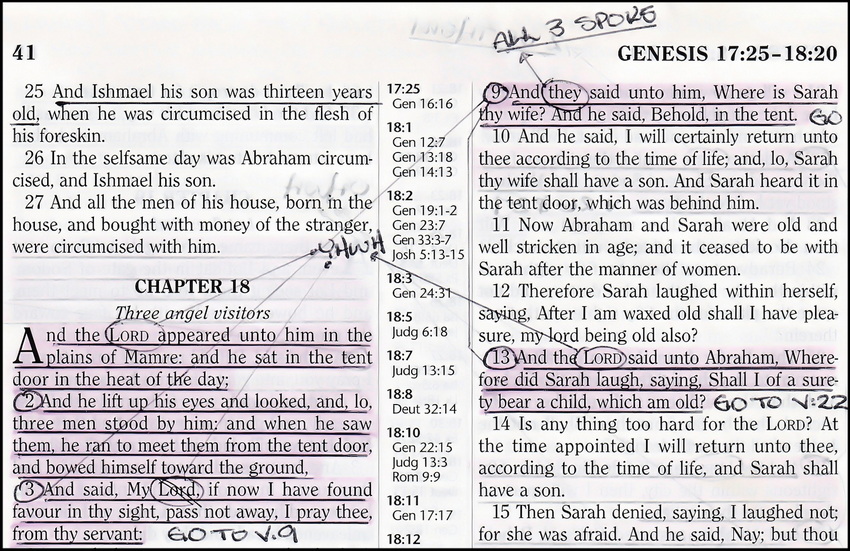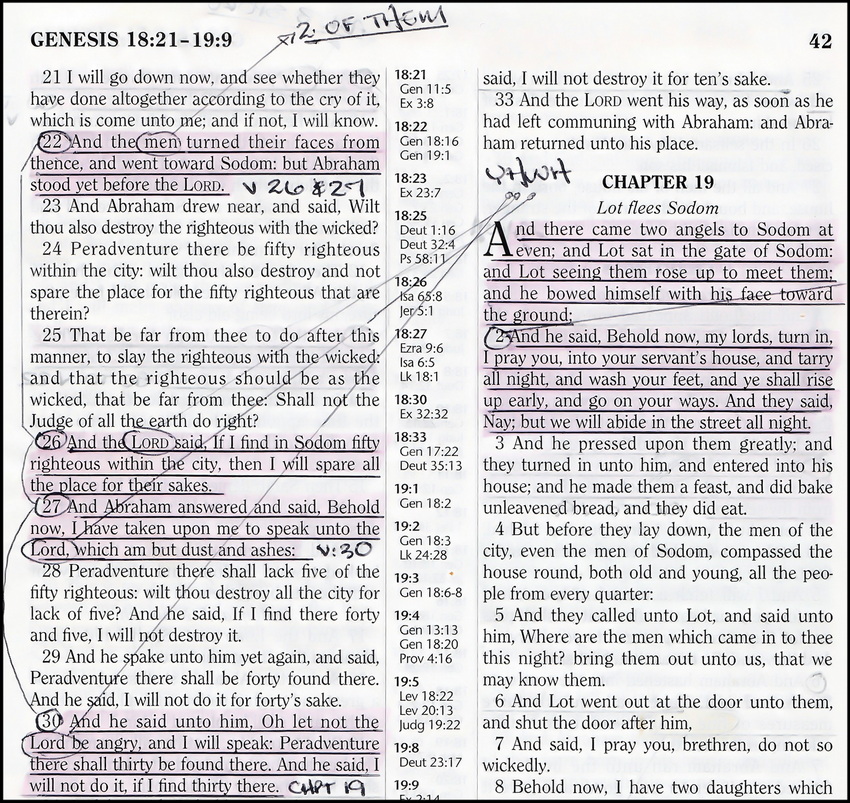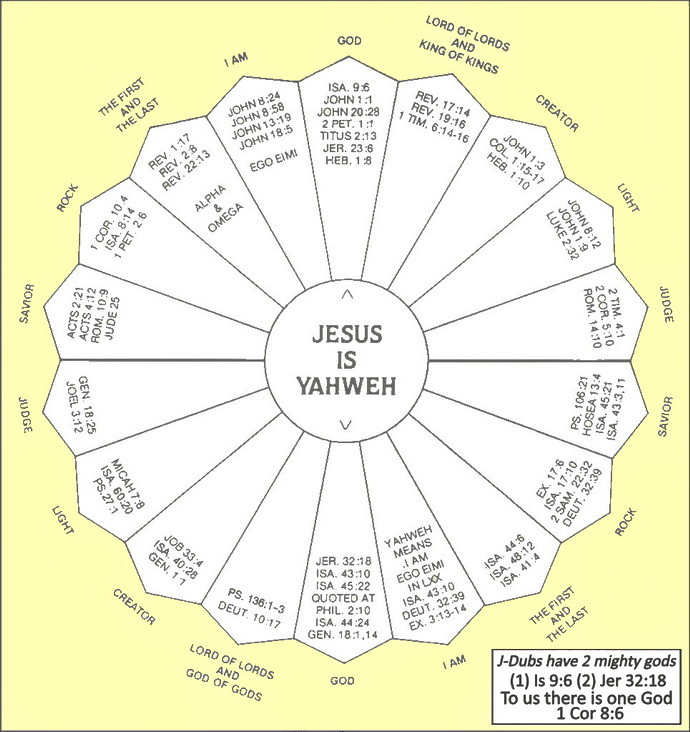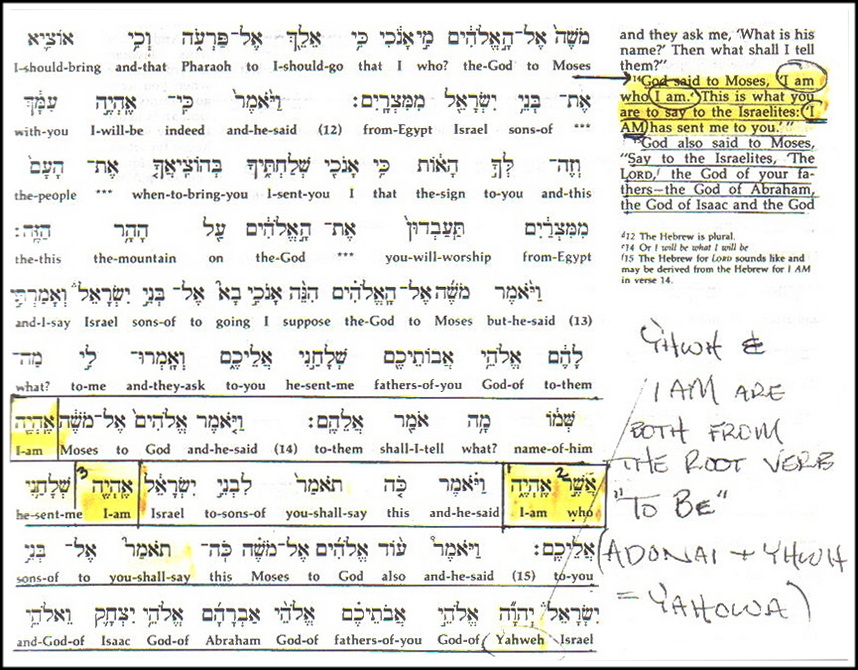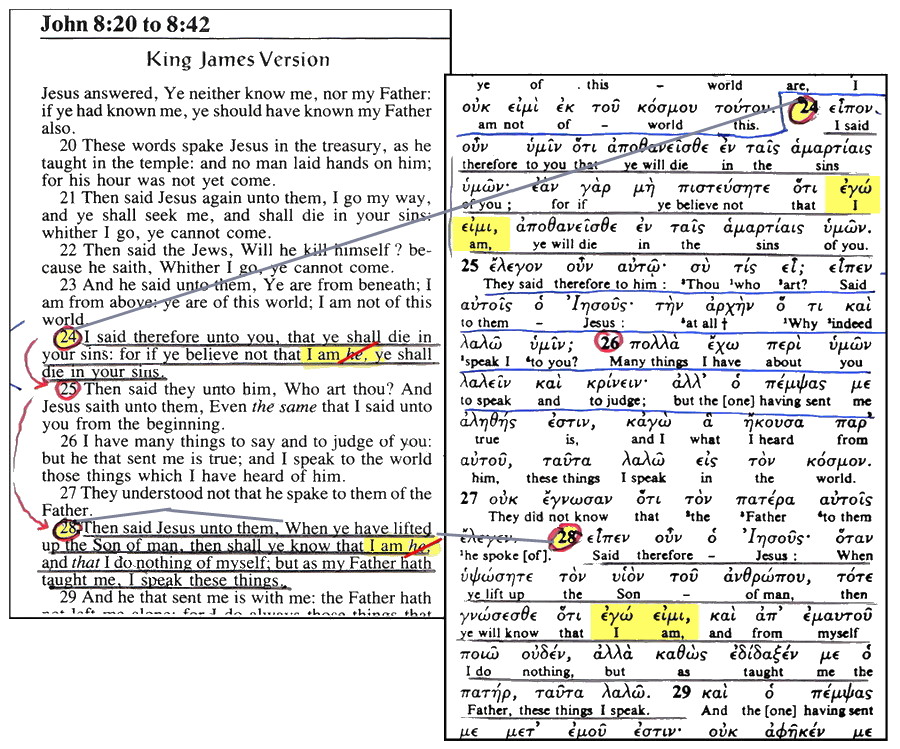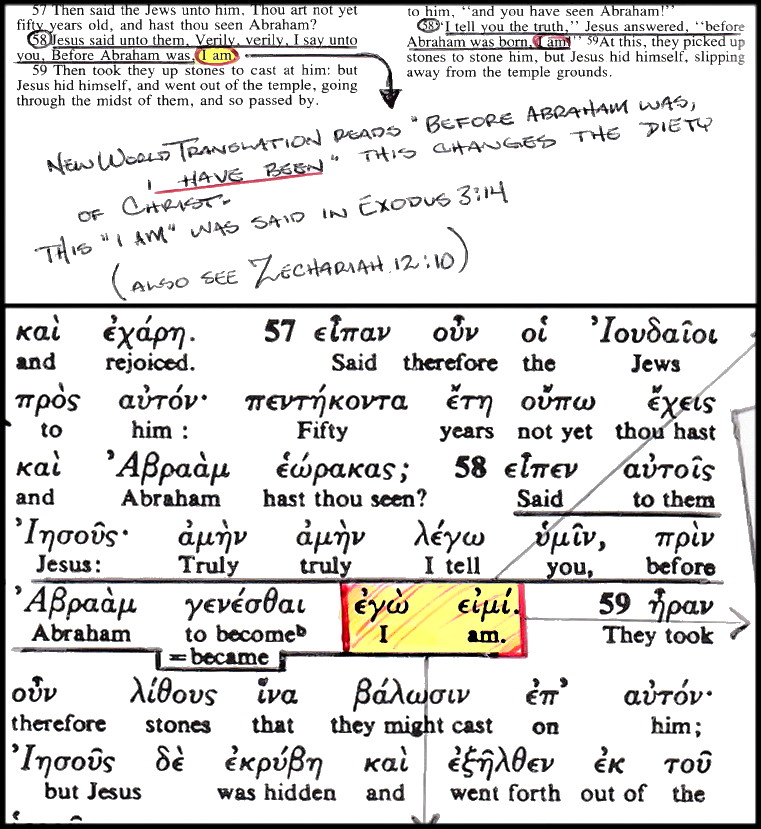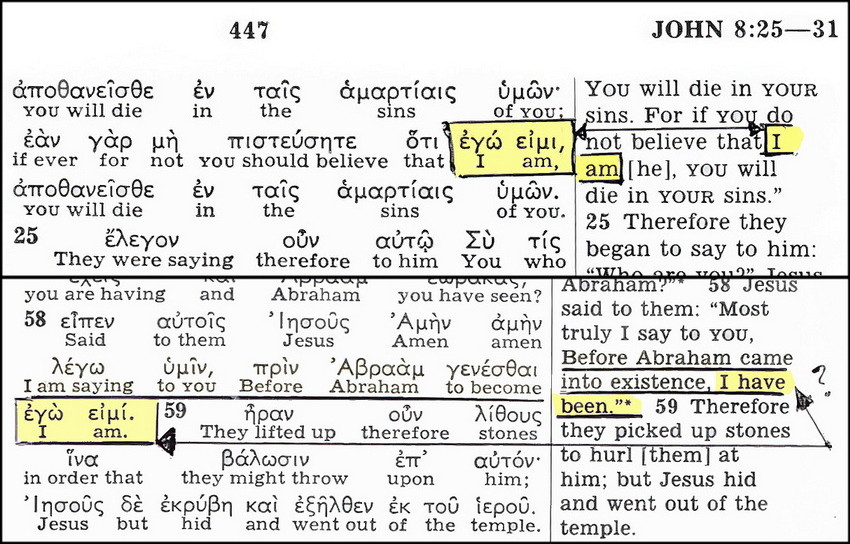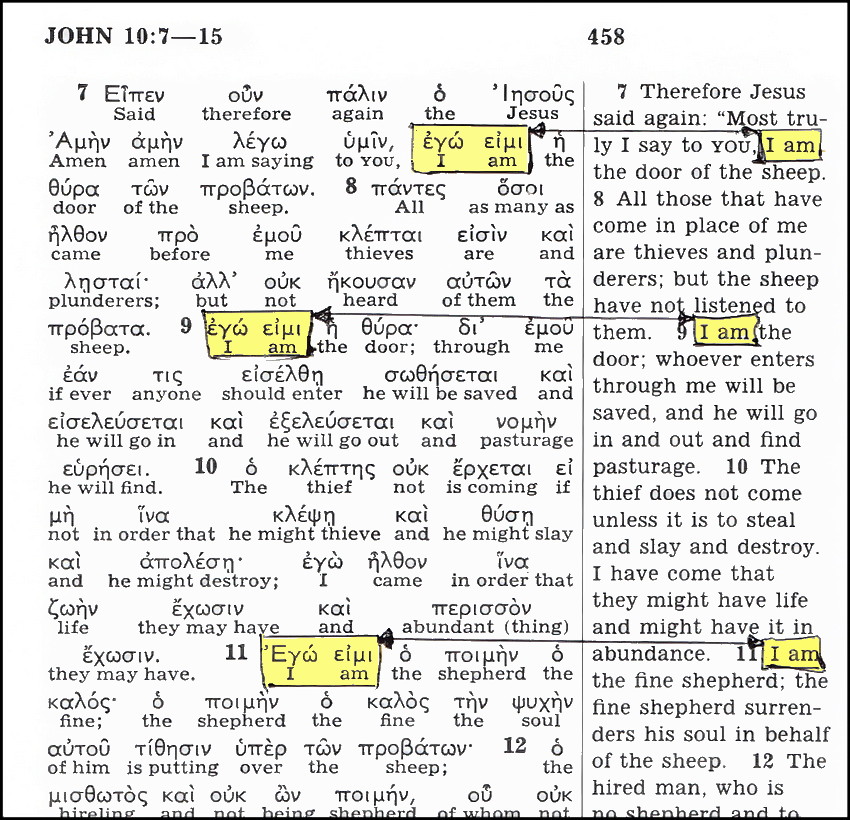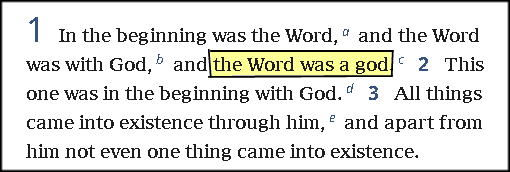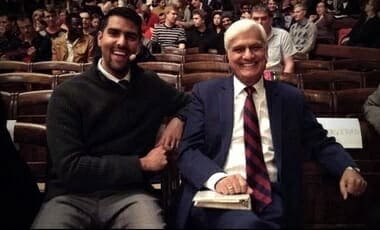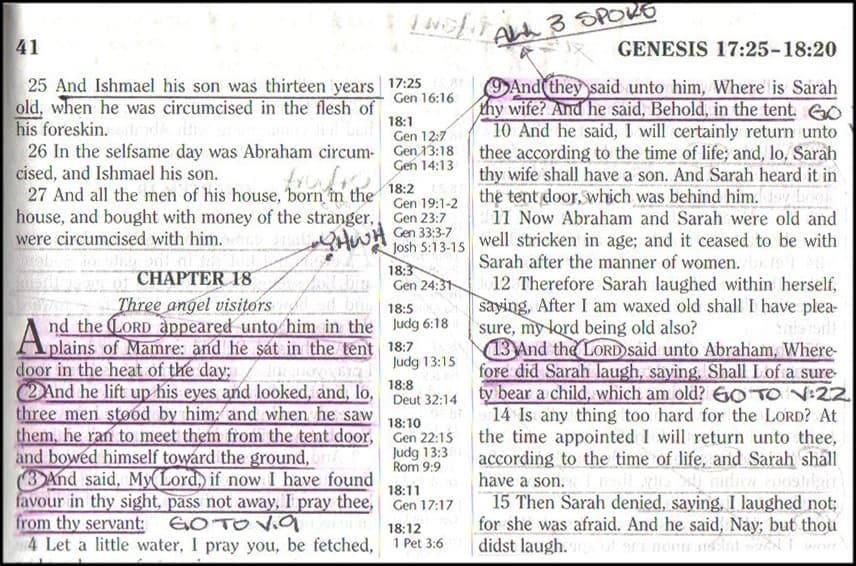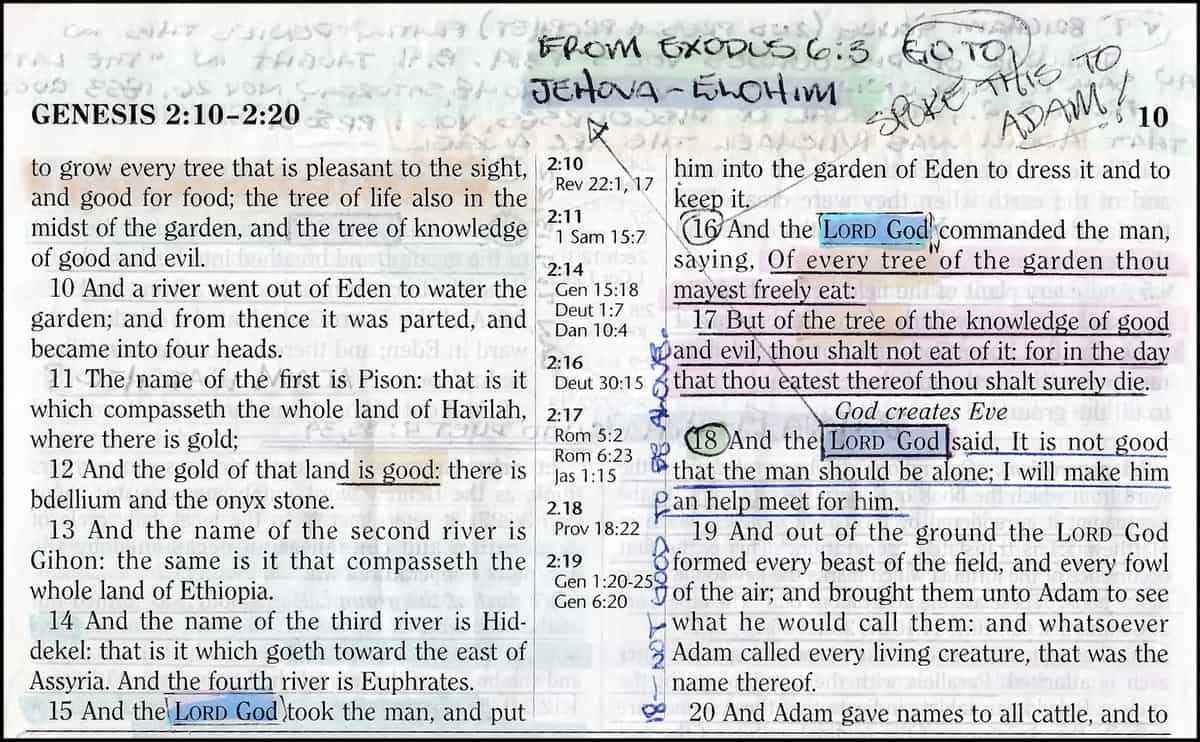JUMP to the update showing Allah and the his word (the Qur’an) got it wrong
(Big Update Today – 12/08/2023)
Jump To “The Eastern Gate” (Ezekiel 44:1-3)
DENNIS PRAGER
From the video description:
In an honest dialogue via a caller to the show, Dennis Prager tells us his lack of understanding of what seems so clear to Christians — MIND YOU, it is still a mystery, but not self-referentially false. In other words, coherent.
Two quick explanations are from two men I respect:
Here is a four part series by theologian Wayne Grudem:
See his books for more doctrinal specifics:
✦ Systematic Theology: An Introduction to Biblical Doctrine
✦ Bible Doctrine: Essential Teachings of the Christian Faith

MANY YEARS AGO when working at Whole Foods I got in a conversation with co-worker. He said he would read what I wrote for him regarding the Trinity. HERE IS THAT LETTER. Another response in a debate from a couple years before that letter to a co-worker may help as well, HERE.
DAVID WOODS UPDATE
ISLAM
- “I understand a… 7th century Arabian caravan robber misunderstanding who is in the Trinity. I understand that. [….] It’s very weird that ‘god’ and his word misunderstood that.”
The fuller interview by Babylon Bee can be found HERE.
AN OLD POST RE-POSTED
SOME CULTS
The LDS Church teaches that “Elohim” properly refers to Heavenly Father, and that “Jehovah” refers to Jesus. While Mormons believe that both Elohim and Jehovah are “united in purpose”, Mormonism claims that “Elohim” and “Jehovah” are actually two separate exalted beings. This is significant, because it would mean that there are actually numerous “gods”—more than just one! But Christians claim that Jehovah (Or Yahweh) and Elohim are the same being, the One True God, who is uncreated and unchanging. Christianity teaches that there only ever has been and will be One Creator God. If Christians are correct, then the notion of eternal progression and exaltation are abominable and idolatrous. The idea that the Father and Son progressed to their current position is a blasphemous claim to the Christian! Therefore, the true nature of Jehovah and Elohim is a significant question! So what does the Bible teach? Does the Bible indicate that Elohim and Jehovah are two different gods “united in purpose”? Or does Scripture teach that Jehovah and Elohim are different names for the same being?
This is an update to an old post from my free blog from many yearn ago. It deals with certain aspects of Mormon’s and Jehovah’s Witness’s understanding of a “bifurcation” (of sorts). Enjoy, I may re-edit this in the weeks coming. This edit is a shortening of the older debate (which itself references an even older discussion. I am thinking this was the late 90’s or early 2000s):
TRINITY
I recommend a book that will assist you in your understanding of Bart Ehrman, it is entitled, Misquoting Truth: A Guide to the Fallacies of Bart Ehrman’s Misquoting Jesus. Learning possibility aside, you believe that YHWH represents Jesus, and Elohim represents Heavenly Father, right? I will elucidate with an old debate:
You Jeff, are not arguing against me when I speak of sex in heaven, you are speaking or arguing against personalities further up the LDS-chain of command than yourself (I have posted this before):
Joseph Fielding Smith Jr., Doctrines of Salvation, Vol.2, p.48:
The Father has promised us that through our faithfulness we shall be blessed with the fulness of his kingdom. In other words we will have the privilege of becoming like him. To become like him we must have all the powers of godhood; thus a man and his wife when glorified will have spirit children who eventually will go on an earth like this one we are on and pass through the same kind of experiences, being subject to mortal conditions, and if faithful, then they also will receive the fulness of exaltation and partake of the same blessings. There is no end to this development; it will go on forever. We will become gods and have jurisdiction over worlds, and these worlds will be peopled by our own offspring. We will have an endless eternity for this.
An endless eternity of celestial sex is what that last sentence meant. Okay, I will leave you to argue with your ex-president in an LDS book Doctrines of Salvation.
How many Jesus’ are there?? Lets do a little Bible study in Genesis. I will post some scripture from Genesis 18 and 19. The pink highlights are what we are going to read (pink is for Jehovah’s Witnesses, green is for Mormons… I will now have to add a bit of green to these verses as I can use them with LDS).
(CLICK TO ENLARGE)
And the FINISHER
So again, with your understanding of who Elohim and YHWH is, as before, your theology is less fit for what the bible displays as clearly Trinitarian. How can Jesus be three people, and then also speak to Himself in heaven while on earth? I mean, you say YHWH is Jesus, orthodox Christianity says this is one name for God (1x1x1=1), Elohim is another.
No Christian doctrine depends on the longer version of the 1 John:7-8. It never has, and Ehrman doesn’t reject the Trinity for this verse either. He does so because he is a philosophical naturalist. Matthew 28:19-20 states the concept of one God (“in name,” GK singular) expressed in three persons (“of the Father and of the Son and of the Holy Spirit”) just as clearly as those words in 1 John.
According to you Jesus is “a” God, as well as other “persons before Heavenly Father as well as after Heavenly Father. However, the Old Testament states:
- “See now that I, I am He, and there is no God besides Me” (Deuteronomy 32:39 NASB)
- “Before Me there was no God formed, and there will be none after me” (Isaiah 43:10 NASB)
- “Is there any God besides Me, or is there any other Rock? I know of none” (Isaiah 44:8 NASB)
- “I am the Lord, and there is no other; besides Me there is no God” (Isaiah 45:5 NASB)
However, Heavenly Father’s parents on another earth may themselves not have achieved exultation, whereas a person who at one time (on another planet in the myriad of Mormon worlds with possible gods that inhabit them) could have owned a brothel, but later was sealed in a temple ceremony and repented of his way may be an even more powerful God than Heavenly Father. Odd.
Just in case people here do not understand what Bot is doing, he is arguing against one infinite God and arguing for an infinite amount of finite Gods.
DIETY OF CHRIST
According to LDS theology, Jesus did not exist at one point in history… at least until Heavenly Father had a bit of foreplay with one of his wives and maybe a martini or two (Brigham Young was the only distributor of alcohol in Utah for some time… he’s exulted, right?) and a long night of hot – steamy… well, you get the point, Jesus was born. This is not the belief of any Christian, the apostles, the church fathers, and the like. Only LDS believe this, not the church even for the first 100 years believed this, as the Scriptures make clear. Jesus created the space/time continuum, he was not pre-dated by DNA, matter, gods, or the like.
Heavenly Father didn’t create the eye, or the pancreas, these predate Heavenly Father, and were passed on to him via his parents “sexing it up.” And the DNA for eyes and pancreas’s were passed to them via an act of sex, and so on ad-infinitum.
Jesus and Heavenly Father were born into a cosmos that enforced its natural laws (both physical and moral) on Jesus and Heavenly Father, whereas these forces were created by God and didn’t pre-date God. The former is not deity, the later is.
IRR has a good short article where they answer the following:
- The Hebrew word Elohim is grammatically a plural form, and in a couple hundred occurrences in the Old Testament does mean “gods.” However, about 2,600 times Elohim functions as a singular noun. We know this for four reasons
Here are the four reasons noted:
First, in these passages it is very common for the noun to take singular pronouns, verbs, and descriptive nouns. If you read a sentence saying “Elohim is good,” you know that Elohim in this sentence must be singular because the verb is singular (“is”). The same thing applies to expressions like “Elohim our Father” or “Elohim sits on his throne.” We see this use of singular words in relation to Elohim right in the first verse of the Bible: “In the beginning God [Elohim] created the heavens and the earth” (Gen. 1:1). The verb “created” in this verse is singular, not plural.
Second, the Old Testament frequently uses the word Elohim as a name or title for Yahweh (Jehovah), who is of course a singular being. For example, Genesis 2:4 refers to the Creator as Yahweh Elohim (Jehovah God). Over half of the verses in the Old Testament that use the name Elohim also refer to him directly as Yahweh.
Third, the ancient Greek translation of the Old Testament known as the Septuagint translated the Hebrew word Elohim in these contexts as “God,” not “gods.” For example, Genesis 1:1 in the Septuagint says, “In the beginning God [theos, the singular word for “God”) made the heavens and the earth.”
Fourth, the New Testament, written in Greek, also uses the singular form theos when quoting Old Testament texts referring to Elohim. For example, Jesus quoted Deuteronomy 6:13 as saying, “You shall worship the Lord your God and serve him only” (Matt. 4:10). In the Hebrew text, Deuteronomy 6:13 says Elohim. In both the Septuagint and in the quotation in Matthew, the Greek word used is the singular theos.
These four facts prove beyond reasonable doubt that Genesis 1:1 is referring to a single God, not a group of gods, when it speaks about Elohim creating the world.
In another article by IRR, they go on to enforce the above thinking:
…There are over 700 verses in the Old Testament that show Jehovah (LORD) and Elohim (God) are the same God. Many of these verses also state that Jehovah is the only Elohim. Following are a few examples.
Isaiah 43:10,11. Ye are my witnesses, saith the LORD [Jehovah] and my servant whom I have chosen; that ye may know and believe me, and understand that I am he: before me there was no God [Elohim] formed, neither shall there be after me. I, even I, am the LORD [Jehovah]; and beside me there is no savior.
Note from these verses that there are several things which God wants us to know, believe, and understand: (1) There is only one God (Elohim) and Jehovah is that one true God. (2) There were no Elohims formed before Jehovah. This means that Jehovah does not have a Father. That is, no God (Elohim) preceded him, by whom He was procreated. (3) There will be no Elohims formed after Jehovah. Some say that Isaiah 43:10,11 is talking about idols. But that cannot be true for there certainly have been idols and false gods made and worshiped since this passage was written. Therefore, when God said no gods would be formed after him, it must mean no real, true Gods.
Isaiah 44:6,8. Thus saith the LORD [Jehovah the King of Israel, and his redeemer the LORD of hosts; I am the first, and I am the last; and beside me there is no God [Elohim] … Fear ye not, neither be afraid: have not I told thee from that time, and have declared it? ye are even my witnesses. Is there a God [Elohim] beside me? yea, there is no God [Elohim] I know not any.
The emphatic “Thus saith Jehovah” in the above verse commands our attention. The following points are made under authoritative declaration: (1) Jehovah is the first Elohim and the last Elohim. There can be only one first and only one last. Again, this rules out the possibility of any other Gods existing throughout all of eternity past and all of eternity future. It also again shows that Jehovah and Elohim are not different Gods. (2) Jehovah is the only God (Elohim) that exists. This again rules out the possibility of other sovereigns existing. (3) No reasonable person would challenge the intellect of God. When He says that He does not know of something, this certainly does not imply any limitation in the scope or capacity of His knowledge. On the contrary, when He says He does not know of something, we may be assured this means that thing does not exist. So it is plain that when God says He does not know of any other Gods it is because they do not exist. Thus, these verses affirm in the clearest possible terms that no other Gods exist, nor will exist, throughout all of time and space, in this universe or any other.
[….]
As we have seen from the Old Testament Scriptures above, it is surely wrong to say that Elohim, Jehovah, and the Holy Ghost are separate Gods. The Bible states emphatically and repeatedly that there is only one God, it declares that Elohim is Jehovah, and it uses the names Elohim, Jehovah, and Adonai interchangeably. The Bible also teaches that the Father is God, the Son is God, and the Holy Ghost is God (Acts 5:3,4). The awesome but inescapable conclusion is that God is Tri-une in nature. How gracious that He has stooped to reveal Himself to us in His infallible Word. How crucial that we interpret His Word accurately.
One of the best books I have read on the topic of the Trinity is by an ex-Oneness Pentecostal, Robert Bowman. Herein is some discussion on this “triuness” of God in relation to Jehovah’s Witnesses (J-DUBS):
The rest of this book will be concerned with the biblical material relating to the Trinity, considering the arguments advanced by JWs to show that it is unbiblical.
We begin with the biblical teaching that there is one God. The JWs affirm that monotheism is the biblical teaching (p. 12), citing several Scriptures in support (p. 13). And trinitarians could not agree more. There is only one God, and this God is one. The oneness of God is the first plank in the trinitarian platform. For this reason I would agree with the booklet’s argument that the plural form elohim for God in the Old Testament cannot be evidence of the Trinity (pp. 13-14).
The Trinity and the Oneness of God
But two problems need attention. First, JWs claim that the Bible’s affirmations of monotheism mean “that God is one Person—a unique, unpartitioned Being who has no equal” (p. 13). As has already been explained, trinitarians do not regard the three persons as “partitions” of God, or the Son and Spirit as beings outside God yet equal to him. Indeed, if “person” is defined to mean an individual personal being, then trinitarians will agree that in that sense “God is one Person.” Thus, in arguing as if these truths contradicted the Trinity, the JWs show they have misconstrued the doctrine. In fact, that God is one “Person” in this sense does not prove that he is not also three “persons” in the sense meant by trinitarians.
Second, biblical monotheism does not simply mean that the being of the Almighty God is one being. That is true enough, but the Bible also teaches simply that there is one God. The Bible is quite emphatic on this point, repeating it often in both the Old Testament (Deut. 4:35, 39; 32:39; 2 Sam. 22:32; Isa. 37:20; 43:10; 44:6-8; 45:5, 14, 21-22; 46:9) and the New Testament (Rom. 3:30; 16:27; 1 Cor. 8:4, 6; Gal. 3:20; Eph. 4:6; 1 Tim. 1:17; 2:5; James 2:19; Jude 25). And the very meaning of the word monotheism is the belief in one God.
It is therefore important to note that the JWs flatly deny this most basic of biblical teachings. Although they admit that there is only one Almighty God, they claim that there are, in addition to that God, and not counting the many false gods worshiped by idolaters, many creatures rightly recognized in the Bible as “gods” in the sense of “mighty ones” (p. 28). These “gods” include Jesus Christ, angels, human judges, and Satan. The JWs take this position to justify allowing the Bible to call Jesus “a god” without honoring him as Jehovah God.
The question must therefore be asked whether Witnesses can escape the charge that they are polytheists (believers in many gods). The usual reply is that while they believe there are many gods, they worship only one God, Jehovah. But this belief is not monotheism, either. The usual term for the belief that there are many gods but only one who is to be worshiped is heno theism.
The more important question, of course, is whether the Bible supports the JWs’ view. The explicit, direct statements of the Bible that there is only one God (cited above) cannot fairly be interpreted to mean that there are many gods but only one who is almighty, or only one who is to be worshiped, or only one who is named Jehovah. There is only one Almighty God Jehovah, and he alone is to be worshiped—but the Bible also states flatly that he is the only God.
More precisely, the Bible says that there is only one true God (John 17:3; see also 2 Chron. 15:3; Jer. 10:10; 1 Thess. 1:9; 1 John 5:20), in contrast to all other gods, false gods, who are not gods at all (Deut. 32:21; 1 Sam. 12:21; Ps. 96:5; Isa. 37:19; 41:23-24, 29; Jer. 2:11; 5:7; 16:20; 1 Cor. 8:4; 10:19-20). There are, then, two categories of “gods”: true Gods (of which there is only one, Jehovah) and false gods (of which there are unfortunately many).
The JWs, however, in agreement with most antitrinitarian groups today that claim to believe in the Bible, cannot agree that there is only one true God, despite the Bible’s saying so in just those words, because then they would have to admit that Jesus is that God. Therefore, they appeal to a few isolated texts in the Bible that they claim honor creatures with the title gods without implying that they are false gods. We must next consider these texts briefly.
Are Angels Gods?
There are two kinds of creatures that the JWs claim are honored as gods in Scripture—angels and men. We begin with angels. The usual prooftext in support of this claim is Psalm 8:5, which the NWT renders, “You also proceeded to make him [man] a little less than godlike ones.” The word translated “godlike ones” here is elohim, the usual word for “God,” but (because plural) also translatable as “gods.” Since Hebrews 2:7 quotes this verse as saying, “You made him a little lower than angels” (NWT), the Witnesses conclude that Psalm 8:5 is calling angels “gods.”
There are numerous objections to this line of reasoning, only some of which can be mentioned here. First, it is questionable that in its original context elohim in Psalm 8:5 should be understood to refer to angels and translated “gods” or “godlike ones.” This is because in context this psalm is speaking of man’s place in creation in terms that closely parallel Genesis 1. Psalm 8:3 speaks of the creation of the heavens, moon, and stars (cf. Gen. 1:1, 8, 16). Verse 4 asks how God can consider man significant when compared with the grandeur of creation. The answer given is that man rules over creation—over the inhabitants of the land, sky, and sea (vv. 6-8; cf. Gen. 1:26-28). What links this question and answer in Psalm 8 is the statement that God made man “a little lower than elohim,” which parallels in thought the Genesis statement that man was created “in the image of elohim,” that is, in the image of God (Gen. 1:26-27). This makes it quite reasonable to conclude that in its own context Psalm 8:5 is meant to be understood as saying that man is a little lower than God, not angels.
If this view is correct, why does Hebrews 2:7 have the word angels rather than God? The simple answer is that the author of Hebrews was quoting from the Septuagint, a Greek translation of the Old Testament prepared by Jewish scholars and in common use in the first century. The fact that the writer of Hebrews quoted the Septuagint does not imply that the Septuagint rendering he quoted was a literal or accurate word-for-word translation of the Hebrew text (after all, “angels” is certainly not a literal translation of “gods”). Rather, Hebrews 2:7 is a paraphrase of Psalm 8:5 that, while introducing a new understanding of it, does not contradict it. Psalm 8 says that the son of man (meaning mankind) was made a little lower than God; Hebrews 2 says that the Son of Man (meaning Christ) was made a little lower than the angels. The psalm speaks of man’s exalted status, while Hebrews speaks of Christ’s temporary humbling. Since the angels are, of course, lower than God, and since Christ’s humbled status was that of a man, what Hebrews says does not contradict Psalm 8:5, though it does go beyond it.
It must be admitted that this is not the only way of reading Hebrews 2:7 and Psalm 8:5. It is just possible that Hebrews 2:7 does implicitly understand Psalm 8:5 to be calling angels “gods.” If this were correct, it would not mean that angels were truly gods. It might then be argued that the point of Psalm 8:5 was that man was made just a little lower than the spiritual creatures so often wrongly worshiped by men as gods. This would fit the context of Hebrews 2:7 also, since from Hebrews 1:5 through the end of chapter 2 the author argues for the superiority of the Son over angels. That is, Hebrews might be taken to imply that even God’s angels can be idolized if they are wrongly exalted or worshiped as gods (which some early heretics were doing [cf. Col. 2:18]).
Moreover, this interpretation would also fit Hebrews 1:6, which quotes Psalm 97:7 as saying that all of God’s angels should worship the Son. Psalm 97:7 in Hebrew is a command to the “gods” (identified in the immediate context as idols) to worship Jehovah. Thus, Hebrews 1:6 testifies at once both to the fact that angels, if they are considered gods at all, are false gods, and that Jesus Christ is worshiped by angels as Jehovah the true God.
There are other reasons for denying that angels are truly gods in a positive sense. The Bible flatly states that demonic spirits are not gods (1 Cor. 10:20; Gal. 4:8). Since demons are just as much spirits, and presumably are just as much “mighty ones” (though wicked) as the holy angels, it follows that angels cannot be gods by virtue of their being “mighty ones. “
Furthermore, the translation of elohim in Psalm 8:5 as “godlike ones” runs into the problem of contradicting the Bible, which flatly and repeatedly states that none are like God (Exod. 8:10; 9:14; 15:11; 2 Sam. 7:22; 1 Kings 8:23; 1 Chron. 17:20; Ps. 86:8; Isa. 40:18, 25; 44:7; 46:5, 9; Jer. 10:6-7; Mic. 7:18), though creatures may reflect God’s moral qualities (Rom. 8:29; Eph. 4:24; Col. 3:10; 2 Peter 1:4; 1 John 3:2).
Finally, even if angels were gods in some positive sense, that would not explain in what sense Jesus Christ is called “God,” since he is not an angel—he is God’s Son (Heb. 1:4-5); is worshiped by all the angels (Heb. 1:6); is the God who reigns, not a spirit messenger (Heb. 1:7-9); and is the Lord who created everything, not an angel created to serve (Heb. 1:10-13).
Before leaving this question, it should be noted in passing that Satan is called “the god of this age” (2 Cor. 4:4 Niv), but clearly in the sense of a false god, one who is wrongly allowed to usurp the place of the true God in the present age. That is the point of 2 Corinthians 4:4, not that Satan is a mighty one.
Are Mighty Men Gods?
The Witnesses claim that not only mighty angels, but also mighty men, are called “gods” in Scripture in recognition of their might. This claim, however, is open to even more difficult objections than the claim that angels are gods.
The Bible explicitly denies that powerful men, such as kings and dictators and military leaders, are gods (Ezek. 28:2, 9; see also Isa. 31:3; 2 Thess. 2:4). In fact, frequently in Scripture “man” and “God” are used as opposite categories, parallel with “flesh” and “spirit” (Num. 23:19; Isa. 31:3; Hos. 11:9; Matt. 19:26; John 10:33; Acts 12:22; 1 Cor. 14:2). In this light, texts that are alleged to call men “gods” in a positive sense ought to be studied carefully and alternative interpretations followed where context permits.
The usual text cited in this connection, as in the JW booklet, is Psalm 82:6, “I said, you are gods,” which is quoted by Jesus in John 10:34. This verse has commonly been interpreted (by trinitarians as well as antitrinitarians, though with different conclusions drawn) to be calling Israelite judges “gods” by virtue of their honorable office of representing God to the people in judgment. Assuming this interpretation to be correct, the verse would not then be saying that judges really are gods in the sense of “mighty ones.” Rather, it would simply be saying that as judges in Israel they represented God. This representative sense of “gods” would then have to be distinguished from a qualitative sense, in which creatures are called “gods” as a description of the kind of beings they are.
There are good reasons, however, to think that the Israelite judges are being called “gods” not to honor them but to expose them as false gods. This may be seen best by a close reading of the entire psalm.
In Psalm 82:1 Jehovah God is spoken of by the psalmist in the third person: “God takes His stand… He judges…” (NAss). The psalmist says, “God [elohimi takes his stand in the assembly of God [el]; he judges in the midst of the gods [elohimr (my translation). Here we are confronted with two elohim: God, and the judges, called by the psalmist “gods.”
In verses 2-5 God’s judgment against the Israelite judges is pronounced. They are unjust, show partiality to the wicked, allow the wicked to abuse the poor and helpless, and by their unjust judgment are destroying the foundations of life on earth.
Then in verse 6 we read, “I said, ‘You are gods….‘” This is a reference back to the psalmist’s calling the judges “gods” in verse 1: “…He judges in the midst of the gods.” The succeeding lines make clear that although the psalmist referred to the wicked judges as “gods,” they were not really gods at all and proved themselves not up to the task of being gods. This is made clear in two ways.
First, the second line of verse 6 adds, “And all of you are sons of the Most High.” What can this mean? The similar expression “sons of God” is used in the Old Testament only of angels (Gen. 6:2, 4; Job 1:6; 2:1), unless one interprets Genesis 6:1-4 to be speaking of a godly line of men. The Israelite judges were neither angels nor godly men. Hosea 1:10 speaks prophetically of Gentiles becoming “sons of the living God,” but this has reference to Gentiles becoming Christians and thus adopted children of God (Rom. 9:26). The judges were not Christians, either. The easiest, if not only, explanation is that they are called “sons of the Most High” in irony. That is, the psalmist calls them “sons of the Most High” not because they really were, but because they thought of themselves as such, and to show up that attitude as ridiculous (see a similar use of irony by Paul in 1 Cor. 4:8). If this is correct, it would imply that they were also called “gods” in irony. Thus the thought would be that these human judges thought of themselves as gods, immortal beings with the power of life and death.
The next lines, in Psalm 82:7, confirm such an interpretation: the judges are told that they are ordinary men who will die. The clear implication is that though they seemed to rule over the life and death of their fellow Israelites, they were no more gods than anyone else, because—like even the greatest of men—they will die.
Then, in verse 8, the psalmist addresses God in the second person, “Arise, 0 God, judge the earth!…” (NASB). In other words, the judges have proved themselves to be false gods; now let the true God come and judge the world in righteousness.
This way of reading Psalm 82 does not conflict with or undermine Christ’s argument in John 10:34-36. When he says, “If he called them gods, to whom the word of God came…” (John 10:35 NASB), nothing in the text demands that the “gods” be anything but false gods. Jesus’ argument may be paraphrased and expanded as follows:
Is it not written in the Law which you call your own, “I said, `You are gods”? The psalmist, whom you regard as one of your own, and yourselves as worthy successors to him, called those wicked judges, against whom the word of God came in judgment, “gods.” And yet the Scripture cannot be broken; it must have some fulfillment. Therefore these worthless judges must have been called “gods” for a reason, to point to some worthy human judge who is rightly called God. Now the Father has witnessed to my holy calling and sent me into the world to fulfill everything he has purposed. That being so, how can you, who claim to follow in the tradition of the psalmist, possibly be justified in rejecting the fulfillment of his words by accusing me of blasphemy for calling myself the Son of God? How can you escape being associated with those wicked judges who judged unjustly by your unjust judgment of me?
By this interpretation, Jesus is saying that what the Israelite judges were called in irony and condemnation, he is in reality and in holiness; he does what they could not do and is what they could not be. This kind of positive fulfillment in Christ contrasted with a human failure in the Old Testament occurs elsewhere in the New Testament, notably the contrast between the sinner Adam and the righteous Christ (Rom. 5:12-21; 1 Cor. 15:21-22, 45).
To summarize, the judges called “gods” in Psalm 82 could not have been really gods, because the Bible denies that mighty or authoritative men are gods. If they are called “gods” in a positive sense, it is strictly a figurative expression for their standing in God’s place in judging his people. But more likely they are called “gods” in irony, to expose them as wicked judges who were completely inadequate to the task of exercising divine judgment. However one interprets Psalm 82, then, there is no basis for teaching that there are creatures who may be described qualitatively as gods.
We conclude, then, that the biblical statements that there is only one God are not contradicted or modified one bit by the prooftexts cited by JWs to prove that creatures may be honored as gods. There is one Creator, and all else is created; one Eternal, and all else temporal; one Sovereign Lord, and all else undeserving servants; one God, and all else worshipers. Anything else is a denial of biblical monotheism.
Robert M. Bowman, Why You Should Believe In The Trinity: An Answer to Jehovah’s Witnesses (Grand Rapids, MI: Baker Books, 1997), 49-58.
More J-DUB Stuff
To lay a basis for what is to come let us read some Scripture from Isaiah via the 1611 Authorized King James version next to the New World Translation and my preferred translation (Christian Standard Bible), for clarity:
Is 43:10-13
- 10 Ye are my witnesses, saith the LORD, and my servant whom I have chosen: that ye may know and believe me, and understand that I am he: before me there was no God formed, neither shall there be after me. 11 I, even I, am the LORD; and beside me there is no saviour. 12 I have declared, and have saved, and I have shewed, when there was no strange god among you: therefore ye are my witnesses, saith the LORD, that I am God. 13 Yea, before the day was I am he; and there is none that can deliver out of my hand: I will work, and who shall let it? (KJV)
- 10 “You are my witnesses,” declares Jehovah, “Yes, my servant whom I have chosen, So that you may know and have faith in me*And understand that I am the same One. Before me no God was formed, And after me there has been none. 11 I—I am Jehovah, and besides me there is no savior.” 12 “I am the One who declared and saved and made known When there was no foreign god among you. So you are my witnesses,” declares Jehovah, “and I am God. 13 Also, I am always the same One; And no one can snatch anything out of my hand. When I act, who can prevent it?” (NWT)
- 10 “You are my witnesses”— this is the LORD’s declaration— “and my servant whom I have chosen, so that you may know and believe me and understand that I am he. No god was formed before me, and there will be none after me. 11 I—I am the LORD. Besides me, there is no Savior. 12 I alone declared, saved, and proclaimed— and not some foreign god among you. So you are my witnesses”— this is the LORD’s declaration— “and I am God. 13 Also, from today on I am he alone, and none can rescue from my power. I act, and who can reverse it?” (CSB)
Is 44:6
- Thus saith the LORD the King of Israel, and his redeemer the LORD of hosts; I am the first, and I am the last; and beside me there is no God. (KJV)
- This is what Jehovah says, the King of Israeli and his Repurchaser, Jehovah of armies: ‘I am the first and I am the last.There is no God but me.’ (NWT)
- This is what the LORD, the King of Israel and its Redeemer, the LORD of Armies, says: I am the first and I am the last. There is no God but me. (CSB)
Is 44:24
- Thus saith the LORD, thy redeemer, and he that formed thee from the womb, I am the LORD that maketh all things; that stretcheth forth the heavens alone; that spreadeth abroad the earth by myself; (KJV)
- This is what Jehovah says, your Repurchaser, Who formed you since you were in the womb: “I am Jehovah, who made everything. I stretched out the heavens by myself, And I spread out the earth. (NWT)
- This is what the LORD, your Redeemer who formed you from the womb, says: I am the LORD, who made everything; who stretched out the heavens by myself; who alone spread out the earth; (CSB)
Is 45:5
- I am the LORD, and there is none else, there is no God beside me: I girded thee, though thou hast not known me: (KJV)
- I am Jehovah, and there is no one else. There is no God except me. I will strengthen you, although you did not know me, (NWT)
- I am the LORD, and there is no other; there is no God but me. I will strengthen you, though you do not know me, (CSB)
Is 45:18
- For thus saith the LORD that created the heavens; God himself that formed the earth and made it; he hath established it, he created it not in vain, he formed it to be inhabited: I am the LORD; and there is none else. (KJV)
- For this is what Jehovah says, The Creator of the heavens, the true God, The One who formed the earth, its Maker who firmly established it, Who did not create it simply for nothing, but formed it to be inhabited; “I am Jehovah, and there is no one else.” (NWT)
- For this is what the LORD says— the Creator of the heavens, the God who formed the earth and made it, the one who established it (he did not create it to be a wasteland, but formed it to be inhabited)— he says, “I am the LORD, and there is no other. (CSB)
Is 45:22-23
- 22 Look unto me, and be ye saved, all the ends of the earth: for I am God, and there is none else. 23 I have sworn by myself, the word is gone out of my mouth in righteousness, and shall not return, That unto me every knee shall bow, every tongue shall swear. (KJV)
- 22 Turn to me and be saved, all the ends of the earth, for I am God, and there is no one else. 23 By myself I have sworn; the word has gone out of my mouth in righteousness, And it will not return: To me every knee will bend, Every tongue will swear loyalty (NWT)
- 22 Turn to me and be saved, all the ends of the earth. For I am God, and there is no other. 23 By myself I have sworn; truth has gone from my mouth, a word that will not be revoked: Every knee will bow to me, every tongue will swear allegiance. (CSB)
Is 46:9
- Remember the former things of old: for I am God, and there is none else; I am God, and there is none like me, (KJV)
- Remember the former things of long ago, That I am God, and there is no other. I am God, and there is no one like me. (NWT)
- Remember what happened long ago, for I am God, and there is no other; I am God, and no one is like me. (CSB)
And in fact this knowledge about God – that He is the only God, is part of our salvonic understanding, for instance in John 17:3(a) we find this statement by Jesus, “And this is life eternal, that they might know thee the only true God.” Amen! I love these Scriptures, they are foundational to our understanding of God’s nature. Starting here and using proper exegesis and allowing the Bible to interpret the Bible, let us read some more passages.
One of my favorite books is Genesis, and in Genesis is one of my favorite examples of who God is. I will here scan in some of the verses from my KJV Study Bible. Genesis chapter 18:1-3, 9, 13, 22, 26-27, and 30 are displayed below; as well as chpt. 19:1-2, 18, and 24.
Please pay attention to the Genesis 19:24 graphic below –
(CLICK TO ENLARGE)
And the FINISHER
- “Then the LORD (YHWH) rained upon Sodom and upon Gomorrah brimstone and fire from the LORD (YHWH) out of heaven.”
Clearly here we see that Jehovah in heaven rained fire down from Jehovah in heaven. Hmmm. Is this a statement about God’s nature or not? Maybe we will go to the SHEMA to put this problem to rest. The SHEMA is found in Deuteronomy 6:4, and is the most important verse to the orthodox Jewish people, it reads:
- “Hear, O Israel: The LORD our God is one”
Whew! I thought for a second that this God mentioned in Isaiah was something other than singular entity. But wait… what Hebrew word is used here that means “one” in front of Lord. The Hebrew word for a singular “one” is “yachid,” meaning the only one. The word is used in Genesis 22:2 where God tells Abraham to “take your son, your only son Isaac….” This is what we should find here… let’s see. Ahhh shoot!! It isn’t that word at all? The word in Hebrew used here is “echad,” it denotes a unity, or united one. This word is used in Genesis 2:24 it is stated that “a man will his father and mother and be united to his wife, and the two shall become one flesh.” Maybe we need to go back to Isaiah to make sense out of this.
Let’s read from Isaiah 44:6 again to ease the mind:
- Thus saith the LORD the King of Israel, and his redeemer the LORD of hosts; I am the first, and I am the last; and beside me there is no God.
Wait a minute. “Thus saith the LORD the King of Israel, AND his redeemer the LORD of hosts”? It seems that two divine persons are speaking here, yet both are only one God, the Creator and Savior! Arrrgggh! Doesn’t Exodus say what God’s name is. Exodus 3:14 reads:
- And God said unto Moses, I AM THAT I AM: and he said, Thus shalt thou say unto the children of Israel, I AM hath sent me unto you.
The New World Translation reads this way:
- At This God said to Moses: “I SHALL PROVE TO BE WHAT I SHALL PROVE TO BE.” And he added: “this is what you are to say to the sons of Israel, ‘I SHALL PROVE TO BE has sent me to you.’”
Maybe a Hebrew interlinear will help. The English portion is the NIV (Click to Enlarge)
That didn’t help the New World Translation out much, especially realizing that the Translation Committee didn’t know Hebrew or Greek. Maybe the Septuagint will assist. The Septuagint was written by 70 scholars (probably a few more) and was the first time a book had been translated from one language into another, that is, the Old Testament. It was completed about 200 years before Christ; let’s look at this verse via the Greek translation of the Hebrew Scriptures.
DRAT!
Well, that yellow highlighted part literally means “I am” in Greek. Maybe the Bible uses this Greek term for “I am” (GK: ego eimi) elsewhere. Let’s try the New Testament; maybe John chapter 8 will shed some light on this matter:
JOHN 8:24-25, 53, 56-59 (I cross out “he” in 24, you will see why shortly)
- 24 I said therefore unto you, that ye shall die in your sins: for if ye believe not that I am
he, ye shall die in your sins.25 Then said they unto him, Who art thou? And Jesus saith unto them, Even the same that I said unto you from the beginning [….] 53 Art thou greater than our father Abraham, which is dead? and the prophets are dead: whom makest thou thyself? [….] 56 Your father Abraham rejoiced to see my day: and he saw it, and was glad. 57 Then said the Jews unto him, Thou art not yet fifty years old, and hast thou seen Abraham? 58 Jesus said unto them, Verily, verily, I say unto you, Before Abraham was, I am. 59 Then took they up stones to cast at him: but Jesus hid himself, and went out of the temple, going through the midst of them, and so passed by. (KJV) - 24 “Therefore I told you that you will die in your sins. For if you do not believe that I am
he, you will die in your sins.”25 “Who are you?” they questioned. “Exactly what I’ve been telling you from the very beginning,” [….] 53Are you greater than our father Abraham who died? And the prophets died. Who do you claim to be?” [….]56“Your father Abraham rejoiced to see my day; he saw it and was glad.”57 The Jews replied, “You aren’t fifty years old yet, and you’ve seen Abraham?” 58 Jesus said to them, “Truly I tell you, before Abraham was, I am.”59 So they picked up stones to throw at him. But Jesus was hidden and went out of the temple. (CSB)
By the way, make no mistake about it, this crowd was trying to kill Jesus for claiming to be connected to Exodus 3:14. For elsewhere we find that these first century Jews understood what Jesus was trying to claim, for we read further along that:
JOHN 10:30-33
- 30 …I and my Father are one. 31 Then the Jews took up stones again to stone him. 32 Jesus answered them, Many good works have I shewed you from my Father; for which of those works do ye stone me? 33 The Jews answered him, saying, For a good work we stone thee not; but for blasphemy; and because that thou, being a man, makest thyself God. (KJV)
- 30…I and the Father are one.” 31 Again the Jews picked up rocks to stone him. 32 Jesus replied, “I have shown you many good works from the Father. For which of these works are you stoning me?” 33“We aren’t stoning you for a good work,” the Jews answered, “but for blasphemy, because you—being a man—make yourself God.” (CSB)
Well, I know whenever I see an italicized “he” (jn 8:24) after “I am,” this “he” is in not a single ancient manuscript, so verse should read “I said therefore unto you, that ye shall die in your sins: for if ye believe not that I am, ye shall die in your sins.” This clear connection of ego eimi to the ego eimi in Exodus is what prompted the question from the Pharisees. You do not have to be a Greek and Hebrew scholar to prove that the Watchtower Society has twisted these verses. Jehovah’s Witnesses’ own study Bibles prove that Jesus was claiming to be the I am. Their 1984 large-print New World Translation of the Holy Scriptures with References has a footnote on Exodus 3:14, admitting that the Hebrew would be rendered into Greek a “Ego eimi”—“I am.” And their 1985 Kingdom Interlinear Translation of the Greek Scriptures reveals that Jesus’ words at John 8:58 are the same: “ego eimi” (footnotes), “I am” (interlinear text). Let’s peer into a few more resources, the first being my most used interlinear (Click to Enlarge):
JOHN 8:24-28 KJV-NIV GREEK INTERLINEAR
JOHN 8:58 KJV-NIV GREEK INTERLINEAR
To be fair, let’s look at the Kingdom Interlinear Translation of the Greek Scriptures (KIT), maybe they have it right and everyone else has it wrong?
KINGDOM INTERLINEAR TRANSLATION (KIT) ~ JOHN 8:24, 58
Why would they change one of the most simple Greek words that stand for “I am” into “I have been” as well as changing Exodus from “I am who I am” into “I Will Prove to Be What I Will Prove to Be” (NWT)? (The newest iteration is this):
- So God said to Moses: “I Will Become What I Choose to Become.” And he added: “This is what you are to say to the Israelites, ‘I Will Become has sent me to you.’” (NWT)
I mean, every other place ego eimi comes up in the Kingdom Interlinear Translation it is translated “I am”. For instance, in case you need more evidence from Jehovah’s witnesses own literature:
KINGDOM INTERLINEAR TRANSLATION (KIT) ~ JOHN 10:7, 9, 11
Maybe the five “translators” (click to see picture of the five New World Translation – “translators) were trying to hide something. What was or is this something? Jesus put it this way in response to the Pharisees when they tried to challenge him. In Matthew 22:43, citing Psalm 110, Jesus said, “How is it then that David, speaking by the Spirit, calls him ‘Lord’ [Messiah]?” Jesus stumped his skeptical Jewish questioners by presenting then with a dilemma that blew their own neat calculations about the Messiah “Lord” (as he did in Psalm 110), when the Scriptures also say the Messiah would be the “Son of David” (which they do in 2 Samuel 7:12.)? The only answer is that the Messiah must be both a man (David’s son or offspring) and God (David’s Lord). Jesus is claiming to be both God and human, at the same time!
WOW! But wait! What about John 17:3(a)? Doesn’t it say that we have to believe in the one true God, and this is part of our salvation? Let’s read that again:
NEW WORLD TRANSLATION JOHN 1:1-3 (right)
How does this jive…? According to this verse and the Isaiah verses, all other gods are false, there is only one true God. This means by default that all other gods are false, right? Maybe if we start at the beginning of John. John 1:1 in my New World Translation reads as follows (right).
“A god”? But part of my salvation depends on believing in the one true God, which means that Jesus must be a what? A false god. Isaiah states that there were no gods made before or after God, and since he is the Creator, He should know that no “gods” were created. Since it seems that the authors of The New World Translation wanted to use occult commentators for verse one of John, as well as trying to cover up connections between Exodus and John, one should maybe try another translation for John 1:1 by persons who are listed at the beginning of the Bible who can be checked out to see if they know Greek and Hebrew, which they do. Let’s see:
KJV – “and the Word was God.” Living Bible – “He has always been alive and is himself God.” Today’s English Version – “and he was the same as God.” New International Version – “and the word was God.” Phillips Modern English – “and was God.” Revised Standard Version – “and the Word was God.” Jerusalem Bible – “and the Word was God.” New English Bible – and what God was, the Word was.” Holman Christian Standard Bible – “and the Word was God.”
While I’ll be the first to admit this may raise questions, one cannot look at this evidence and say that the Trinitarian formula is pagan.
Jesus Fulfilled Ezekiel’s Prophecy
It is something stated quite plainly all throughout the Bible, take for instance the prophecy found in Ezekiel 44:1-3 (KJV).
- 1 Then he brought me back the way of the gate of the outward sanctuary which looketh toward the east; and it was shut. 2 Then said the LORD unto me; This gate shall be shut, it shall not be opened, and no man shall enter in by it; because the LORD, the God of Israel, hath entered in by it, therefore it shall be shut. 3 It is for the prince; the prince, he shall sit in it to eat bread before the LORD; he shall enter by the way of the porch of that gate and shall go out by the way of the same. (KJV)
- 1 The man then brought me back toward the sanctuary’s outer gate that faced east, and it was closed. 2 The LORD said to me, “This gate will remain closed. 3 It will not be opened, and no one will enter through it, because the LORD, the God of Israel, has entered through it. Therefore it will remain closed. The prince himself will sit in the gate to eat a meal before the LORD. He is to enter by way of the portico of the gate and go out the same way.” (CSB)
This “east gate” has, indeed, long been completely sealed. Whatever reason the Muslim rulers of Jerusalem may have had for this action at the time, the most remarkable testimony of this verse is that the Lord (YHWH), the God of Israel, once entered in by it. That is, the Creator, Jehovah, the God of Israel, had become a man, that He might actually enter the temple through the east gate, the gate through which Ezekiel had just seen the shekinah glory come into the house (Ez 43:4). In the new temple, the gate will be open again, and the God/man, the Kink of Kings, Jesus Christ, will enter thereby.
WOW!
More from BIBLICAL HERMENEUTICS contributor Andrew Shanks that explains better than this old paper of mine above:
The Eastern Gate is the only gate from the east leading directly into what used to be the Jewish temple complex.
The gate is part of the city wall rebuilt from 1537 to 1541 by Sultan Suleiman I of the Ottoman Empire. It is believed this is the site of the Gate Beautiful mentioned in Acts 3:2. When Jerome translated the Greek New Testament into Latin (386 A.D.), he translated the Greek word “oraia” (beautiful), into the Latin “aurea” (golden). Thus the Eastern Gate came to us as The Golden Gate instead of The Gate Beautiful.
In 1969 archaeologist James Fleming was investigating the Eastern wall of the Temple Mount. As he went about with his research, the ground gave way and he dropped into a hole about eight feet deep where he found an older gate directly under the present Golden Gate.
According to Jewish tradition, the Messiah will enter the city through the Eastern Gate. [takes a while to load at times]
The gate was bricked over and sealed on the orders of Suleiman I in 1541. Suleiman may have sealed the gate to better defend the city or because he wanted to prevent the fulfillment of the Jewish prophesy of the Messiah’s return through the Eastern Gate. Or maybe he wanted to prevent a Jewish insurrection following a false Messiah who would enter the city through the gate (to bolster his credentials).
Prior to Suleiman I, the gate had been closed in 810 (also by the Muslims), then reopened in 1102 by the Crusaders, and then walled up again by Saladin (the first sultan of Egypt and Syria and the founder of the Ayyubid dynasty) after defeating the Crusaders in 1187 and gaining control of Palestine and the city of Jerusalem. This would have been the prior to construction of today’s blocked gate, because the gate and wall visible today was built by Suleiman I (the Magnificent).
In Ezekiel, written about 550 BCE, we read:
1 Then he brought me back the way of the gate of the outward sanctuary which looketh toward the east; and it was shut. 2 Then said the Lord unto me; This gate shall be shut, it shall not be opened, and no man shall enter in by it; because the Lord, the God of Israel, hath entered in by it, therefore it shall be shut. 3 It is for the prince; the prince, he shall sit in it to eat bread before the Lord; he shall enter by the way of the porch of that gate, and shall go out by the way of the same. (Ezekiel 44:1-3)
Two things should be noticed:
- It says the gate shall be sealed because the Lord, the God of Israel, hath entered in by it. It shall be sealed after the Lord has gone through it; and
- The Lord shall enter in and go out by the same way.
In Mark’s Gospel, on supposedly Palm Sunday, our Lord entered Jerusalem from the Mount of Olives to go to the temple. He would have gone through the Gate Beautiful, the Eastern Gate. In Mark’s Gospel we read:
And Jesus entered into Jerusalem, and into the temple: and when he had looked round about upon all things, and now the eventide was come, he went out unto Bethany with the twelve (Mark 11:11).
Bethany is to the east on the Mount of Olives (Mark 11:1). It is difficult to escape the conclusion that our Lord by, on the same day, “entering in” by “the gate of the outward sanctuary that looks towards the east” and going out “by way of the same”, was intentionally fulfilling the prophecy of Ezekiel 44:1-3 in addition to deliberately fulfilling Zechariah 9:9,
Rejoice greatly, O daughter of Zion; shout, O daughter of Jerusalem: behold, thy King cometh unto thee: he is just, and having salvation; lowly, and riding upon an ass, and upon a colt the foal of an ass.
By approaching on a colt, and entering by the Eastern Gate, and later leaving by the same gate, he was proclaiming who he was loud and clear: the time for hiding his Messiahship from his enemies the Jewish leaders was ended: now he would allow them to be provoked to destroy him.
Whatever the motives of Suleiman the Magnificent in 1541, the bricking up of the gate is confirmation from Almighty God that the Lord, the God of Israel, has already passed through the gate in agreement with Ezekiel 44:2, “This gate shall be shut because the Lord, the God of Israel, has passed through it”.
What we are looking at in the photo above, I believe, is the fulfilment of prophecy, and confirmation Jesus of Nazareth is Christ the Lord, the God of Israel.
(Andrew Shanks then links to this site for more)
WOW! Again
I would be remiss if I didn’t correct a favorite resource of Jehovah’s Witnesses, that is the book entitled, Reasoning from the Scriptures, by the Watchtower Bible and Tract Society. I will also refute some of the Watchtower’s misquoting of Church Fathers found in the Watchtower booklet Should You Believe in the Trinity. I realize this is long, but if you read it with thoughtful patience, you will begin to see just how a false religious movement can distort and twist not only Scripture, but history as well as scholars. Enjoy, but be warned, it is a bit technical.
HERE IS THE PDF

